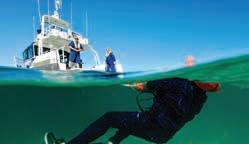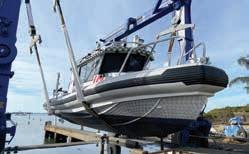
9 minute read
Illawarra News
$565,000 vessel improves search capability
Port Kembla Naiad a ‘valuable investment’ in Illawarra boaters’ safety.
Crews from MR Port Kembla would be able to respond faster to an emergency on the water following the delivery of their new $565,000 rescue vessel, Police and Emergency Services Minister David Elliott said.
Mr Elliott said the 10m Naiad, Port Kembla 31, had arrived at its new home on Port Kembla Harbour in mid-July.
“Port Kembla 31 is one of 38 new rescue vessels funded by a $37.6 million four-year State Government investment to support the vital, lifesaving work of Marine Rescue NSW volunteers,” he said.
“This outstanding rescue vessel is a valuable investment in the safety of the Illawarra’s large local boating community and its many visiting boaters. As well as operating within the harbour, the boat can quickly deploy up to 30nm out to sea.”
Commissioner Stacey Tannos said the boat, purpose-designed and built to meet demanding local operating conditions, would prove a reassuring presence for locals and visitors alike.
“Boaters in the Illawarra can rest easier knowing that this state of the art craft is at the ready should they run into trouble,” he said. “Built by Yamba Welding & Engineering, it is part of our ongoing commitment to support manufacturing in NSW, as well as the safety of boaters.”
Unit Commander Kevin Bradley thanked the local community for its generous support for the unit’s energetic fundraising to contribute 20 per cent of the cost of the new vessel.
He said the vessel was a significant improvement over the unit’s former catamaran, PK 30,
Port Kembla 31 is lowered into the water for delivery to the unit.
which members recently stripped of its livery ahead of its sale.
He said PK 30 had served the unit well on numerous missions.
“The upgraded search and rescue technology on PK 31, including radar, sonar and FLIR night vision, will improve our search capability,” he said. “With a greater rear deck area, larger windows for better visibility, improved handling and manoeuvrability and greater volunteer comfort, our crews will be able to operate more safely for longer periods and in a wider range of weather and sea conditions.”
‘New’ boat fills gap as old workhorse retires
With our brand new vessel due for delivery around the end of the year, MR Kioloa crews will be plying our local waterways on a redeployed vessel from the Mid North Coast over the next few months.
Unit Commander Peter White, Len Gallina and Erik Adriaanse travelled to MR Port Macquarie to take delivery of the northern unit’s superceded Cobia.
This loan vessel will take over rescue duties at Kioloa following the sale of our old Cobia workhorse, which regrettably required some major work and in the end proved uneconomical to repair.
Our temporary vessel is another 6.25m model.
Although the centre console version lacks the weather protection of our old boat, our crew members have been impressed by its speed and stability.
It is a welcome addition to our rescue capabilities, already responding to two emergencies.
The more recent incident saw two boaters thrown from their vessel near Racecourse Beach, north of Kioloa, and hit by the motor as the boat spun in circles on the water. Our crew arrived on scene to find both boaters had made it to the beach and were receiving first aid from onlookers while waiting for a NSW Ambulance to arrive.
One of the boaters escaped with bad bruising but his mate was not so lucky, receiving deep lacerations to his leg from the propeller.
He was airlifted by the Toll rescue helicopter to Wollongong hospital.
Their boat eventually ran aground on the beach.
As well as not having a kill switch on their motor, neither man was wearing a lifejacket, which almost proved disastrous as the badly
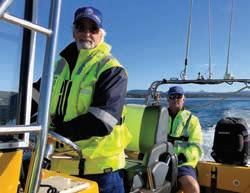
Len Gallin and Erik Adriaanse on board the former MR Port Macquarie vessel on loan to MR Kioloa until its new boat arrives.
injured man was unable to swim and his friend struggled to keep him afloat until they got to the beach.
Although we were unable to beach our boat to assist at this point, the next morning Peter and Len helped the boat’s owner to recover it from the beach using the unit’s tractor - a service we often provide to boaters bogged on our local ramp.
Peter White
Sussex Inlet team stretches operational reach
Focus on winter training builds rescue readiness for summer emergencies.
Marine Rescue Sussex Inlet members have taken advantage of the calm before the storm, braving the chill to maintain their training regimen throughout winter.
Although there is a lower demand for the unit’s services during the colder months, the operational tempo ticks up as summer draws close and recreational and fishing boats find themselves in trouble on the treacherous Sussex Inlet bar.
The addition of two Rescue Water Craft, together with a Ford Ranger and trailer have enhanced our capability to respond rapidly to emergencies on this crossing and expanded our operational reach beyond St George’s Basin, the Sussex Inlet River and the seas east of Wreck Bay to surrounding waterways previously out of reach.
To ensure our familiarity with these waters, the unit has held RWC training at locations such as Fishermans Paradise, Lake Conjola and Swan Lake.
We are working on developing joint search and rescue operations with our neighbouring units at Jervis Bay and Ulladulla, which have both assisted us over the past six months.
We are grateful for the support of MR Ulladulla Master Lesley Kelly, MR Jervis Bay Unit Commander, Tony Dagger and MR Kioloa Commander Peter White, who have travelled to lend their knowledge and experience to our unit members working toward their Leading Crew rating.
Thank you, too, to Regional Training Manager Stuart Massey and Regional Operations Manager Bruce Mitchell for their support, time and expertise.
With restrictions again in place due to Covid, the unit has returned to online training for various courses. We are also developing unit-specific training videos to compliment MRNSW training materials, covering a range of RWC skills and vessel equipment such as Multi-Functional Displays, radar and night vision camera. Sociallydistanced practical training has been delivered outdoors in small groups where possible.
Despite these challenges, members have achieved the following ratings over winter: five Senior Crew, two Leading Crew, two Radio Operators, three Crew Members and one RWC operator, with more on track.
Karen Lowry & Brett Eurell
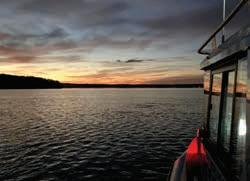
Sussex Inlet 20 heads out for a night exercise on St Georges Basin as part of a Leading Crew training course led by RTM Stuart Massey.
Covid trip proves importance of teamwork
I’m writing this from downtown Bundaberg in Central Queensland on the last few days of a 10 week caravanning holiday.
Having left NSW pre-2021 Covid restrictions, we have been travelling through outback NSW and Queensland and up through the Gulf Country to the tip of Australia at Cape York and are now just making our way back home. We’ll probably have to head inland when we are in NSW to avoid any Covid hot spots.
Our Ulladulla base and operations have been left in the more-thancapable hands of my trusty Deputy Dave Lindley, who has managed our team of committee members, skippers, radio operators, crews and other personnel flawlessly.
Of course, this has been made easier because our committee and members are more than capable.
Having a competent team meant that we could enjoy ourselves on our trip, knowing full well that all issues would be taken good care of by the relevant responsible people.
I will be back home in less than a week now and I suppose I will have to get used to the mask-wearing etc that has eluded us in Queensland.
After we clean the red dust from our hair, van and car, I will conduct a debrief with the committee members and attend to any residual issues.
Training will be my main focus. I hope all our trainees have been using the down-time to keep their skills current and using our online training systems to further their learning. With fundraising sadly taking a back seat during the lockdown, our marketing team will need to be ready to jump straight back into the task once restrictions have been lifted.
Since June, our crews have responded to just 10 incidents, with colder weather, an horrific storm and, of course, the virus deterring most boaters.
Dave Hall
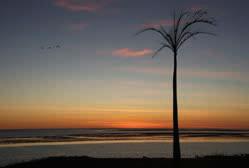
Sunset over the water at Karumba in Queensland’s Gulf Country. Photo: Dave Hall.
Fond farewell to faithful Jervis Bay boat
Colin Woods to stay on home waters as unit welcomes replacement.
Winter was marked by one chapter closing and another opening for members of MR Jervis Bay.
Sunday, July 11, was the final day for the unit’s retired rescue vessel Jervis Bay 40 (Colin Woods), for many years the largest boat in the MRNSW fleet.
Members hold a great deal of affection for the 40-foot Steber, which spent a decade as an Australian Federal Police vessel before being acquired by the then Royal Volunteer Coastal Patrol in November 1999.
JB 40 served faithfully in numerous operations in the intervening 22 years, saving many lives and towing hundreds of boats to safety around the clock in all conditions and acting as a training platform not only for the unit’s members but also in support of RAAF Hercules air drop training exercises.
Stripped of its livery, the boat has been sold to the operators of the Jervis Bay Sea School, so will remain a familiar presence on local waters. Its departure was followed in August by the arrival of its $780,000 replacement, JB 41, which is named after the unit’s late Membership Officer, Coxswain and Watch Officer John Gallimore, who passed away while on radio duty in February this year.
The 13.5m aluminium monohull was built by Harwood Marine on the Clarence River in the State’s north.
With careful observance of Covid risk management protocols, inductions and initial Coxswain and Crew training were able to be carried out upon the vessel’s arrival, helping ensure it will have sufficient crew for its official entry to active duty for the peak season.
Seven unit members have been presented with new pins to accompany their Commissioner’s Citations awarded in recognition of their meritorious service in rescuing 25 Australian Defence Force personnel in imminent danger when their Zodiacs were stranded in 40 knot winds and four metre seas in November 2016.
Congratulations to Paul Haslam, Kevin Hill, Brian McParlane, Harold Plum, Lester Shute, Michael Sutton and Robert Zivkovic for this achievement.
Sadly, members are mourning
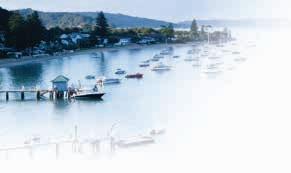
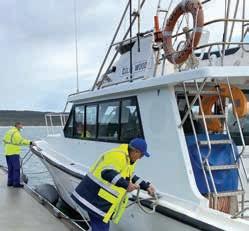
MR Jervis Bay members Darren Huxter and Lester Shute prepare JB 40 for its farewell from active service in July.
the loss of our former volunteer Desmond Owen.
Des joined the Royal Volunteer Coastal Patrol in 2004 as a radio operator and remained with the unit when it became MR Jervis Bay.
A hard working member, Des was always willing to help new members on radio duty. As well as achieving his Watch Officer rating, Des also was a crew member and Membership Officer and was also involved in fundraising before he left the unit in 2016. As a unit we feel privileged to have known and spent time with Des.
A Smith
